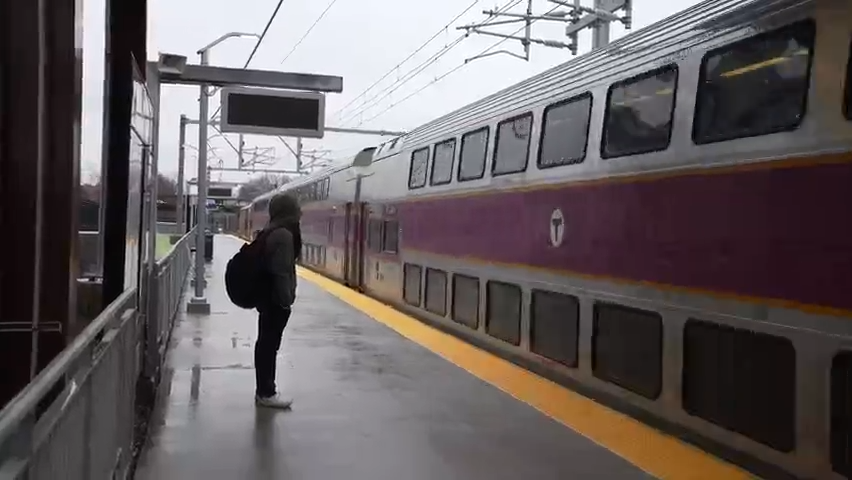Providence to Boston in 45 minutes? RIDOT, MBTA studying faster, cleaner electric trains
At a time when cars, buses and kitchen stoves are going electric, Massachusetts Bay Transportation Authority commuter rail trains still chug along behind diesel locomotives, even on wired Providence Line tracks shared with Amtrak.
Now Rhode Island leaders who have talked about the benefits of speeding commutes to Boston for years are taking some steps to bring faster electric trains to the Providence Line.
What would electric trains mean for the Providence line?
In December, the Rhode Island Department of Transportation and the MBTA applied for a $3-million federal grant to study what it would take to go electric on the Providence Line.
"The full electrification of that route between Providence and Boston will benefit Rhode Island in that it will speed up the train service and ... allow for additional routes, more frequent routes to Boston," Rhode Island DOT Director Peter Alviti Jr. told senators last week in his confirmation hearing. "It will be a faster ride between Providence and Boston that we think will increase the number of people who take the train instead of driving their cars on the I-95 corridor, and would have very positive impact on reducing greenhouse gas emissions."
In addition to reducing travel times, electric trains are more reliable than diesels and don't spew exhaust fumes into communities along the route.
And greater speed means more trains — including Amtrak's Acela express trains — can be run along the congested Northeast Corridor each day without coming into conflict with each other.
More on the commuter rail:Pawtucket/Central Falls train station opens - what to know
The long road to electrifying the MBTA commuter rail track
The MBTA's Fiscal Oversight Board recommended the agency electrify commuter rail back in 2019 and start with a Providence Line pilot. But progress on that goal has been scant despite an unprecedented influx of federal infrastructure money since the start of the pandemic.
The DOT's grant application cites documents indicating the federal government expected the MBTA commuter rail system would be electrified back in 1995.
On its "Greening the Fleet" decarbonization page, the MBTA says it is "considering" ditching diesel.
And in June MBTA officials said they were looking at a "hybrid" approach to electrification throughout the commuter rail system that would power trains both by wire and by battery depending on what section of tracks they are on.
No other major commuter rail system in the country has a hybrid system and it is unclear whether Providence Line trains, which would not need batteries, would have to carry them.
Amtrak train cars on the Providence Line are pulled by locomotives (giant engine cars at the front) that draw electricity from overhead wires.

Providence to Boston in 45 minutes?
The cars on commuter trains in the New York metro area and most big European cities — known in the trade as electric multiple units — are individually propelled on electricity drawn power from a third rail or overhead wire. These self-propelled cars accelerate and decelerate faster than trains pulled by locomotives and don't carry the extra weight of batteries.
In a 2018 report, Boston-based advocacy group TransitMatters estimated that the travel time from Providence to Boston could be sliced from 70 minutes to 45 minutes with a switch to electric trains and upgrades to platforms at some suburban stations.
A 2020 study from the group said full electrification of the Providence Line would require buying new train cars, electrifying the Pawtucket service yard, substation upgrades and some short track segments not wired for Amtrak.
Here's what's behind the attention:Gina Raimondo's CHIPS were up in Washington this week.
Past Rhode Island efforts to improve train service to Boston have been scattershot
Former Gov. Gina Raimondo proposed paying for passes that would let Providence commuters use Amtrak trains. Then she began exploring leasing electric locomotives to provide express service between Providence and Boston. Neither idea went anywhere.
The Providence Line electrification study is expected to cost $3.75 million, with Rhode Island and the MBTA paying $375,000 each to cover the remaining cost not covered by the grant.
The DOT would not comment on what happens if the project does not win a federal grant.
In other Northeast Corridor rail projects, Alviti said Rhode Island continues to work on preliminary design and feasibility of having Amtrak trains stop at T.F. Green Airport. The state received a $2.8-million grant to study building an Amtrak T.F. Green stop, something Warwick elected leaders have sought for years.
On the opposite end of the state, Alviti said the Connecticut Department of Transportation is studying, with RIDOT's help, extending its Shoreline East commuter rail service into Rhode Island.
This article originally appeared on The Providence Journal: RIDOT studying electric trains for Providence commuter rail

